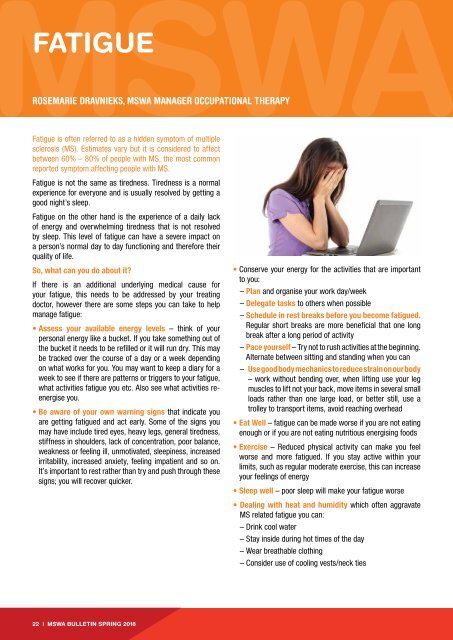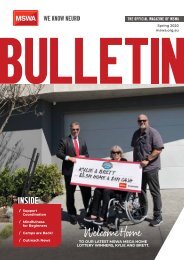Create successful ePaper yourself
Turn your PDF publications into a flip-book with our unique Google optimized e-Paper software.
FATIGUE<br />
ROSEMARIE DRAVNIEKS, MSWA MANAGER OCCUPATIONAL THERAPY<br />
Fatigue is often referred to as a hidden symptom of multiple<br />
sclerosis (MS). Estimates vary but it is considered to affect<br />
between 60% – 80% of people with MS, the most common<br />
reported symptom affecting people with MS.<br />
Fatigue is not the same as tiredness. Tiredness is a normal<br />
experience for everyone and is usually resolved by getting a<br />
good night’s sleep.<br />
Fatigue on the other hand is the experience of a daily lack<br />
of energy and overwhelming tiredness that is not resolved<br />
by sleep. This level of fatigue can have a severe impact on<br />
a person’s normal day to day functioning and therefore their<br />
quality of life.<br />
So, what can you do about it?<br />
If there is an additional underlying medical cause for<br />
your fatigue, this needs to be addressed by your treating<br />
doctor, however there are some steps you can take to help<br />
manage fatigue:<br />
• Assess your available energy levels – think of your<br />
personal energy like a bucket. If you take something out of<br />
the bucket it needs to be refilled or it will run dry. This may<br />
be tracked over the course of a day or a week depending<br />
on what works for you. You may want to keep a diary for a<br />
week to see if there are patterns or triggers to your fatigue,<br />
what activities fatigue you etc. Also see what activities reenergise<br />
you.<br />
• Be aware of your own warning signs that indicate you<br />
are getting fatigued and act early. Some of the signs you<br />
may have include tired eyes, heavy legs, general tiredness,<br />
stiffness in shoulders, lack of concentration, poor balance,<br />
weakness or feeling ill, unmotivated, sleepiness, increased<br />
irritability, increased anxiety, feeling impatient and so on.<br />
It’s important to rest rather than try and push through these<br />
signs; you will recover quicker.<br />
• Conserve your energy for the activities that are important<br />
to you:<br />
– Plan and organise your work day/week<br />
– Delegate tasks to others when possible<br />
– Schedule in rest breaks before you become fatigued.<br />
Regular short breaks are more beneficial that one long<br />
break after a long period of activity<br />
– Pace yourself – Try not to rush activities at the beginning.<br />
Alternate between sitting and standing when you can<br />
– Use good body mechanics to reduce strain on our body<br />
– work without bending over, when lifting use your leg<br />
muscles to lift not your back, move items in several small<br />
loads rather than one large load, or better still, use a<br />
trolley to transport items, avoid reaching overhead<br />
• Eat Well – fatigue can be made worse if you are not eating<br />
enough or if you are not eating nutritious energising foods<br />
• Exercise – Reduced physical activity can make you feel<br />
worse and more fatigued. If you stay active within your<br />
limits, such as regular moderate exercise, this can increase<br />
your feelings of energy<br />
• Sleep well – poor sleep will make your fatigue worse<br />
• Dealing with heat and humidity which often aggravate<br />
MS related fatigue you can:<br />
– Drink cool water<br />
– Stay inside during hot times of the day<br />
– Wear breathable clothing<br />
– Consider use of cooling vests/neck ties<br />
22 | MSWA BULLETIN SPRING <strong>2018</strong>


















